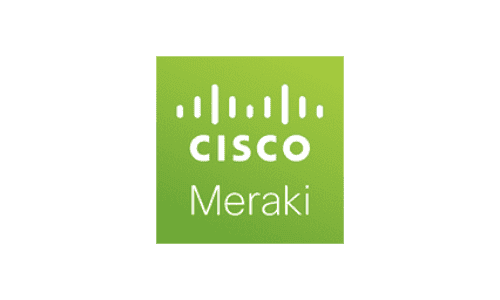Rockoly offers an unforgettable Wagyu team-building experience, featuring cooking workshops and tastings of the finest Japanese, Australian, and American Wagyu beef. These interactive events provide an excellent opportunity for teams to bond and collaborate while learning the nuances of preparing and savoring Wagyu. Participants will develop new culinary skills and expand their palates as they explore the differences among these distinct Wagyu varieties. Through these engaging workshops, Rockoly aims to foster teamwork, communication, and camaraderie in a unique and delicious setting—perfect for both team-building and client appreciation events.
Wagyu Team Building Specials
Japanese Wagyu Ribeye 16oz
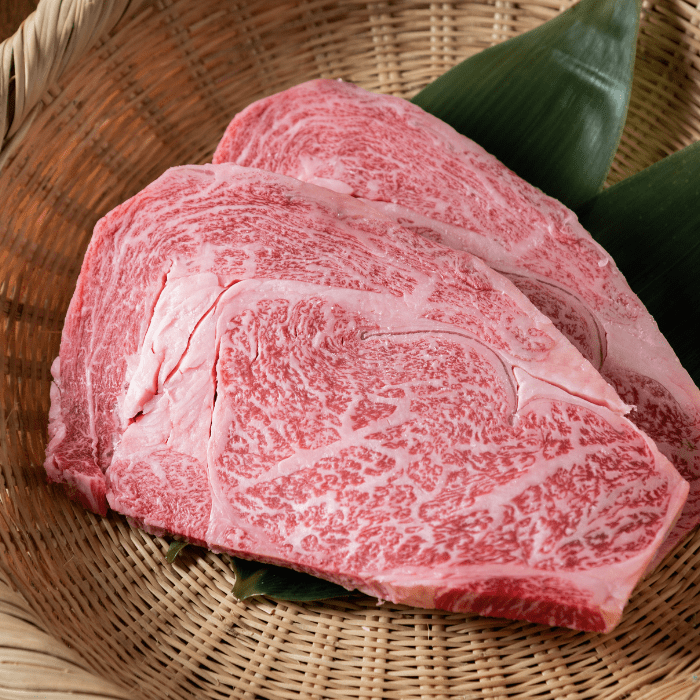
On the menu:
Japanese Wagyu
Workshop Duration:
60 min
Taste Notes:
Rich, full flavor with a delicate sweetness and umami. Often described as having a velvety, almost silky mouthfeel.
Add-on a perfect Whiskey or Wine to go along with your Wagyu.
Japanese Wagyu:
- Originates from Japan, with four main breeds: Japanese Black, Japanese Brown, Japanese Shorthorn, and Japanese Polled.
- Known for its exceptional marbling, tenderness, and flavor due to strict breeding and feeding practices.
- Typically has a higher degree of marbling compared to other Wagyu varieties.
- Graded by the Japanese Meat Grading Association, with the highest grade being A5.
Group Size:
| < 5 | 5 – 30 | 31 – 50 | 50+ |
| $1250 | $250/pp | $240/pp | $230/pp |
Virtual event rate includes personal chef, dedicated event planner, ingredient delivery, gratuities and all service fees.
Australian Wagyu Ribeye 16oz
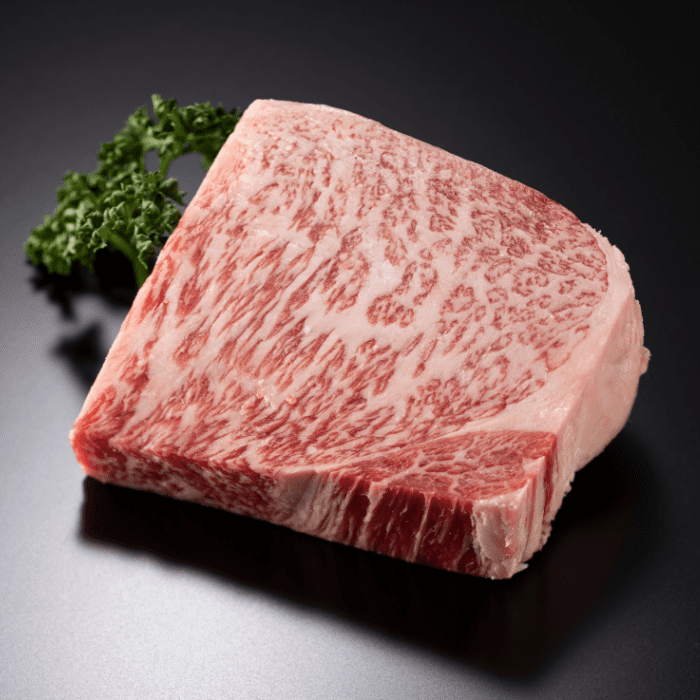
On the menu:
Australian Wagyu
Workshop Duration:
60 min
Taste Notes:
Rich, beefy flavor with buttery notes. Flavorful and tender, with a slightly milder taste than its Japanese counterpart.
Add-on a perfect Whiskey or Wine to go along with your Wagyu.
Australian Wagyu:
- Australian Wagyu is primarily derived from Japanese Black cattle, which have been crossbred with other breeds like Angus or Hereford.
- While the marbling is not as intense as Japanese Wagyu, Australian Wagyu still boasts a higher degree of marbling compared to conventional beef.
- Australian Wagyu cattle are raised on a mix of pasture and grain, with some producers using similar feeding techniques as their Japanese counterparts.
- Australian Wagyu is graded using the Meat Standards Australia (MSA) system or the Aus-Meat grading system.
Group Size:
| < 5 | 5 – 30 | 31 – 50 | 50+ |
| $1175 | $235/pp | $225/pp | $215/pp |
Virtual event rate includes personal chef, dedicated event planner, ingredient delivery, gratuities and all service fees.
American Wagyu Ribeye 16oz
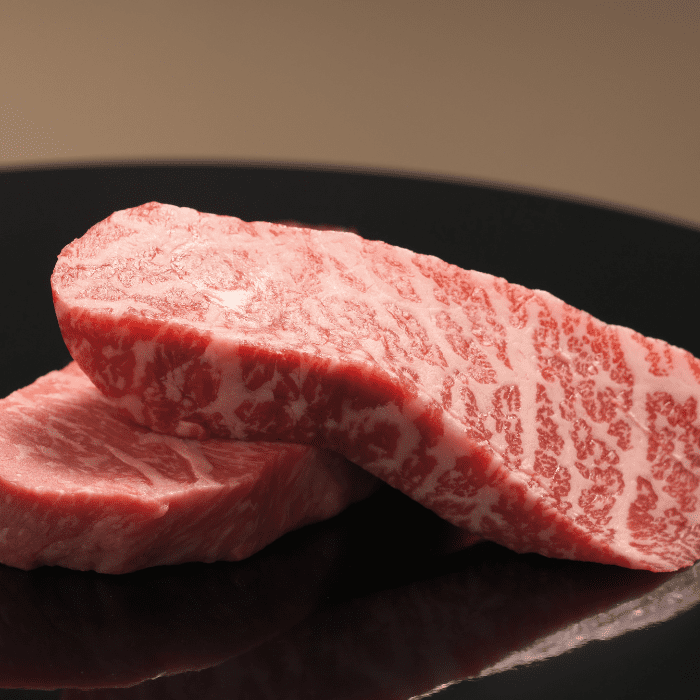
On the menu:
American Wagyu
Workshop Duration:
60 min
Taste Notes:
Rich, buttery, tender and juicy, with a slightly firmer texture than Japanese Wagyu.
Add-on a perfect Whiskey or Wine to go along with your Wagyu.
American Wagyu:
- American Wagyu is a cross between Japanese Wagyu cattle and domestic breeds like Angus or Hereford.
- The marbling is generally less intense than that of Japanese Wagyu, but it is still more marbled than conventional beef.
- American Wagyu cattle are often raised on a mix of pasture and grain, similar to Australian Wagyu. However, feeding practices may vary between producers.
- The USDA grading system is used to grade American Wagyu, with Prime being the highest grade.
Group Size:
| < 5 | 5 – 30 | 31 – 50 | 50+ |
| $925 | $185/pp | $175/pp | $165/pp |
Virtual event rate includes personal chef, dedicated event planner, ingredient delivery, gratuities and all service fees.

100% Satisfaction Guarantee
You are fully protected by our 100% Satisfaction-Guarantee. If you don’t see improved team cohesion and enhanced communication within 30 days following your team-building event, just let us know, and we’ll send you a prompt refund. At Rockoly, we’re committed to delivering results that matter to your team. Your success is our mission.
FOOD FOR THOUGHT
Wagyu Team Building FAQs
What is Wagyu?
Wagyu is a breed of Japanese cattle known for producing high-quality beef with exceptional marbling, tenderness, and flavor. The word “Wagyu” can be broken down into two parts: “wa,” which means Japanese, and “gyu,” which means cow or cattle. The unique marbling in Wagyu beef is due to the high intramuscular fat content, which contributes to its rich taste and buttery texture.
There are four main breeds of Wagyu cattle: Japanese Black (Kuroge), Japanese Brown (Akage), Japanese Shorthorn (Nihon Tankaku), and Japanese Polled (Mukaku). The most famous and sought-after Wagyu beef comes from the Japanese Black breed.
Wagyu beef is often graded by the Japanese Meat Grading Association based on marbling, meat color, texture, and fat color. The highest grade is A5, which signifies the finest quality.
Outside of Japan, Wagyu cattle have been crossbred with other cattle breeds, such as Angus, to create what is known as “American Wagyu” or “Wagyu-style” beef. While this beef may still have a higher degree of marbling compared to regular beef, it is generally not considered to be of the same quality as authentic Japanese Wagyu.
Each Rockoly Wagyu participant will receive a certificate of authenticity tracing the origin of their meat.

What is the difference between Japanese, Australian and American Wagyu?
The primary difference between Japanese, Australian, and American Wagyu lies in their breeding, genetics, and production methods. Here’s a breakdown of the differences:
Japanese Wagyu:
- Originates from Japan, with four main breeds: Japanese Black, Japanese Brown, Japanese Shorthorn, and Japanese Polled.
- Known for its exceptional marbling, tenderness, and flavor due to strict breeding and feeding practices.
- Typically has a higher degree of marbling compared to other Wagyu varieties.
- Graded by the Japanese Meat Grading Association, with the highest grade being A5.
Australian Wagyu:
- Australian Wagyu is primarily derived from Japanese Black cattle, which have been crossbred with other breeds like Angus or Hereford.
- While the marbling is not as intense as Japanese Wagyu, Australian Wagyu still boasts a higher degree of marbling compared to conventional beef.
- Australian Wagyu cattle are raised on a mix of pasture and grain, with some producers using similar feeding techniques as their Japanese counterparts.
- Australian Wagyu is graded using the Meat Standards Australia (MSA) system or the Aus-Meat grading system.
American Wagyu:
- American Wagyu is a cross between Japanese Wagyu cattle and domestic breeds like Angus or Hereford.
- The marbling is generally less intense than that of Japanese Wagyu, but it is still more marbled than conventional beef.
- American Wagyu cattle are often raised on a mix of pasture and grain, similar to Australian Wagyu. However, feeding practices may vary between producers.
- The USDA grading system is used to grade American Wagyu, with Prime being the highest grade.
Japanese Wagyu is considered the most premium due to its unparalleled marbling, tenderness, and flavor, resulting from strict breeding and feeding practices. Australian and American Wagyu, while still offering a higher quality than conventional beef, have less marbling and are generally not as highly regarded as their Japanese counterpart.
How do you pronounce Wagyu?
The word “Wagyu” is pronounced as “wah-gyoo.” The emphasis is on the first syllable, “wah,” with the second syllable pronounced like “gyoo.”
How is preparing Wagyu different from regular steak?
Preparing Wagyu beef is slightly different from preparing regular steak due to its high fat content and marbling. Here are some tips and differences to consider when preparing Wagyu:
- Cooking temperature: Wagyu is best cooked at a lower temperature than regular steak to avoid overcooking the delicate marbling. This will allow the fat to render without overcooking the meat, ensuring a tender, juicy result.
- Cooking time: Since Wagyu has a high fat content, it tends to cook faster than regular steak. Be cautious not to overcook it, as overcooked Wagyu can become tough and lose its unique texture and flavor. Most chefs recommend cooking Wagyu to rare or medium-rare.
- Pre-seasoning: Wagyu’s flavor is already rich and buttery due to its marbling, so it doesn’t require heavy seasoning. A simple seasoning of salt and pepper will usually suffice. However, you may add other seasonings if desired.
- Resting the meat: As with any steak, allowing the Wagyu to rest for a few minutes after cooking helps the meat retain its juiciness and tenderness. It’s generally recommended to let the meat rest for about half the time it took to cook.
- Cutting and serving: When cutting Wagyu, it’s best to slice it thinly to appreciate the tenderness and delicate flavor. Thicker cuts may be overwhelming due to the richness of the fat content.
- Pan-searing: One of the most popular methods of preparing Wagyu is pan-searing. Because of the high fat content, you generally don’t need to add oil or butter to the pan, as the fat will render and create a natural cooking medium. Sear each side for a short amount of time to achieve a nice crust while keeping the inside tender and juicy.
Remember that the goal when preparing Wagyu is to preserve its unique flavor and texture. By following these tips, you can ensure a delicious and enjoyable Wagyu experience, but of course having a master Rockoly Wagyu chef to walk you through the process will ensure success.
ENGAGING. UNIQUE. FUN.
How Rockoly Events Work
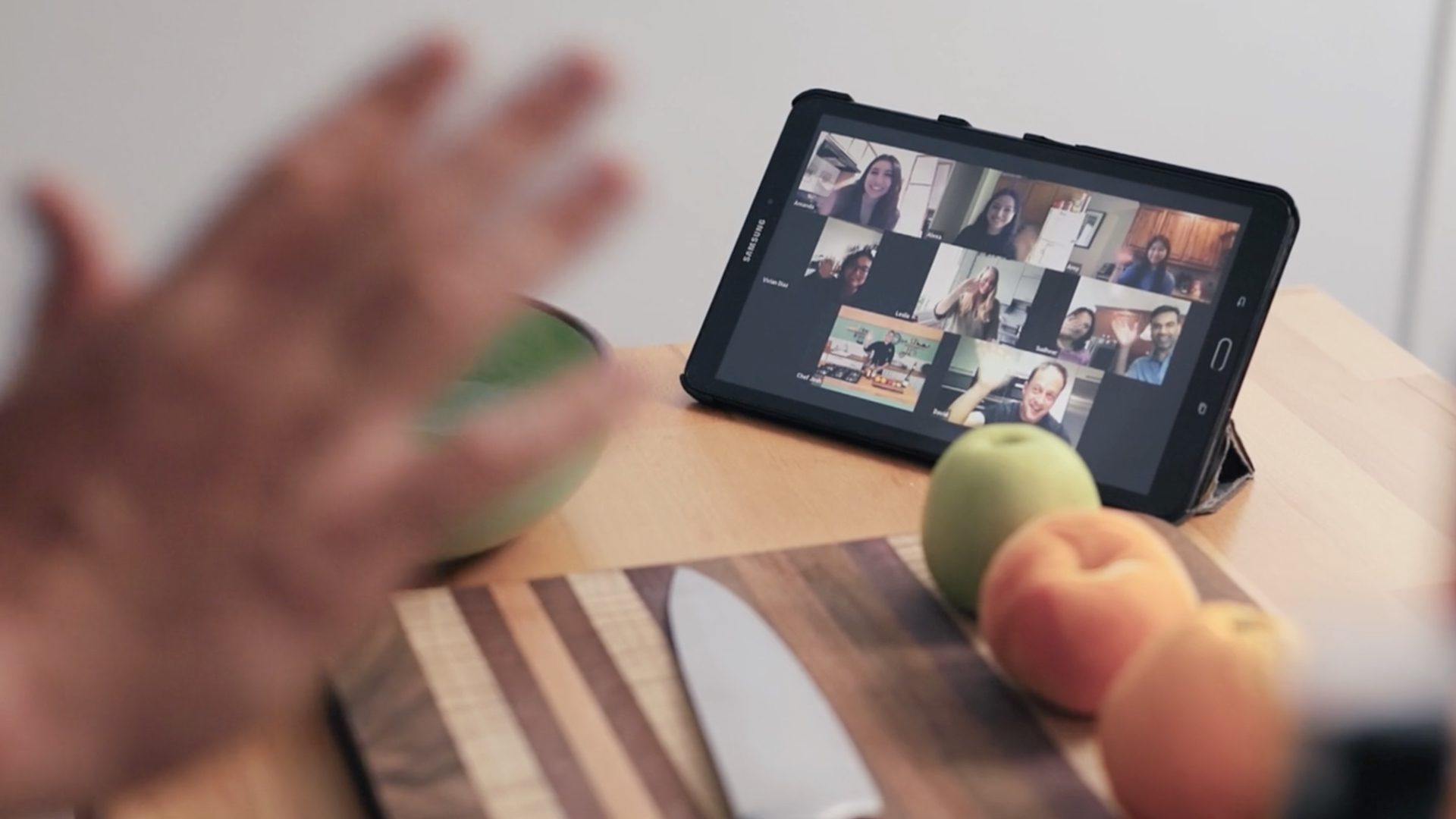
STEP 1
Tell Us About Your Team
How many participants will be joining? What Wagyu would your team like? or maybe a tasting of multiple types / cuts. Would you like to add Whiskey tasting into the mix? Wagyu team building event will be fully customized to your needs!
STEP 2
Choose A Wagyu Workshop
Choose from Japanese, Australian, or US Wagyu cooking workshops, and theMeatery, in collaboration with Rockoly, will provide all the necessary ingredients. Rockoly’s friendly Master Steak Chefs will expertly guide the instruction and team bonding, ensuring an enjoyable and educational culinary experience for all participants.
STEP 3
Connect & Have Fun with Wagyu Team Building!
Time to dive into the world of premium Wagyu beef as you and your team learn about its origins, preparation techniques, and unique flavors. Our hands-on workshops foster collaboration, communication, and connection, while offering an enjoyable and memorable shared experience centered around the exquisite taste of Japanese, Australian, and American Wagyu.


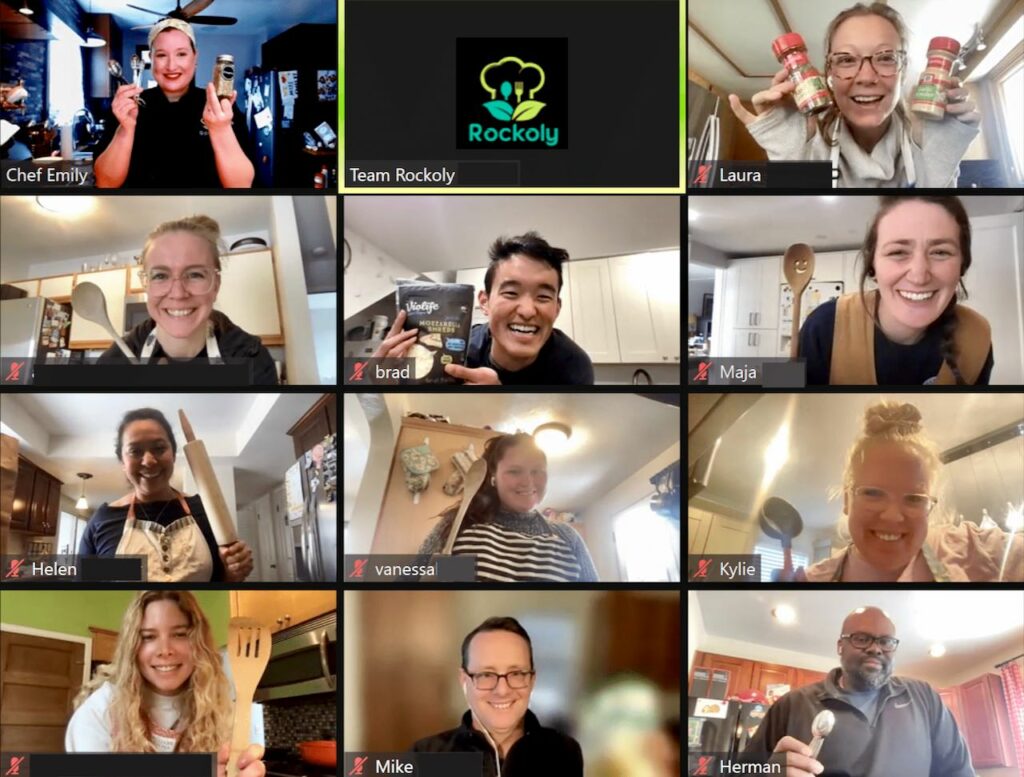
Kylie Bradbury
Webinar & Social Media Specialist




























